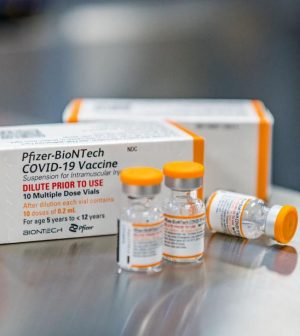- 10 Strategies to Overcome Insomnia
- Could Artificial Sweeteners Be Aging the Brain Faster?
- Techniques for Soothing Your Nervous System
- Does the Water in Your House Smell Funny? Here’s Why
- Can a Daily Dose of Apple Cider Vinegar Actually Aid Weight Loss?
- 6 Health Beverages That Can Actually Spike Your Blood Sugar
- Treatment Options for Social Anxiety Disorder
- Understanding the Connection Between Anxiety and Depression
- How Daily Prunes Can Influence Cholesterol and Inflammation
- When to Take B12 for Better Absorption and Energy
Pfizer Will Ask FDA to Approve Its COVID Vaccine for Kids Under 5

Pfizer Inc. plans to ask the U.S. Food and Drug Administration as soon as Tuesday to authorize its COVID vaccine for emergency use in children aged 6 months to 4 years old.
If approved, the two-shot regimen would become the first approved for use in children this young; older children are already eligible for the vaccine. In December, Pfizer suffered a setback when it announced that two doses of the vaccine, which are one-tenth the amount of an adult dose, did not produce a sufficient immune response in children aged 2 to 4. The company has already started testing a third dose in this age group.
“At this time, we have not filed a submission and we’re continuing to collect and analyze data from both two and three doses in our younger age cohort,” Pfizer spokeswoman Jerica Pitts told the Washington Post on Monday. “As part of our ongoing commitment, we will share new updates as they become available.”
But federal regulators have been eager to review Pfizer’s data in hopes of authorizing shots for young children as early as the end of February, multiple people familiar with the discussions told the Post. If Pfizer waits for data on three doses in these youngest Americans, the data would not be submitted until late March and the vaccine might not be authorized for that age group until weeks later, the newspaper said.
“We know that two doses isn’t enough, and we get that,” one of the people familiar with the situation told the Post. “The idea is, let’s go ahead and start the review of two doses. If the data holds up in the submission, you could start kids on their primary baseline months earlier than if you don’t do anything until the third-dose data comes in.”
Last Friday, Pfizer briefed federal health officials on updated trial data on the shots, an administration official who spoke on the condition of anonymity, told the newspaper.
Those attending the briefing included Dr. Anthony Fauci; David Kessler, chief science officer for the government’s COVID-19 response; a representative from the U.S. Centers for Disease Control and Prevention; and other officials from the U.S. Department of Health and Human Services, the Post reported.
The session included a “robust conversation” that three doses were likely to be much more powerful than just two shots, the administration official said. “But to get to three, you have to get two shots first. … There’s interest in seeing this move forward,” the official told the Post. Expert advisory panels to both the FDA and the CDC are expected to meet on the two-dose application sometime in February.
As the Omicron variant has consumed the country, there has been a sharp increase in pediatric cases of the virus, according to the American Academy of Pediatrics (AAP), which gathers state-level data. Even though most young children tend to do well combating the virus, some can get very ill. Federal officials and experts are anxious to begin a vaccination program for the youngest children because the Pfizer studies showed there were no safety concerns with two doses.
“We understand the urgent need for a safe and effective vaccine for that age group,” AAP CEO Mark Del Monte said in a statement, the Post reported. “We are eager to see the data and will continue to follow the science.”
More information
Visit the U.S. Food and Drug Administration for more on COVID vaccines.
Source: HealthDay
Copyright © 2026 HealthDay. All rights reserved.










